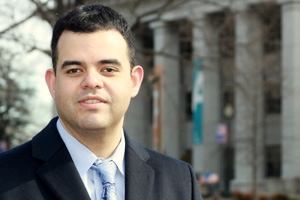On Campus
Legally Blind MPA Student Supports Disabled Workers

Photo by: N. Malysheva
Duilio Correa, SPA/MPA '13, came to American University by chance, but stayed by design – for two degrees and counting.
The Peruvian-born student first came to AU in 2005 for a certificate in Spanish translation, but his advisor, the late Jack Child, encouraged him to stay on and pursue a master's degree in Spanish and Latin American studies.
“At first I was doubtful. I was already working as an information specialist for a government clearinghouse, and legally blind from birth – I didn't really know if I could pull it off,” said Correa.
After finishing his MA in 2008, Correa landed a job developing Spanish-language materials at the National Institutes of Health. Yet, he felt he needed a better foundation in management, and found himself again perusing AU's course offerings. SPA’s MPA program seemed like a good fit, but Correa had to think twice about saddling himself with a full load of night classes given his demanding job.
He took the bet, and it's paid off. Graduation is in sight, and Correa has landed a plum position as a management and program analyst at Health and Human Services, a job he says he wouldn't have gotten without his AU education. In his new position, Correa will be working with the human resources team at HHS to recruit people with disabilities and develop programs catering to disabled employees.
“Struggle is necessary for success,” says Correa, who came to the U.S. as a teen with his mother – his driving force and inspiration. “If the opportunity you're looking for doesn't arise, sometimes you have to create it.”
While Correa doesn't feel his disability – a congenital eye condition that limits his central vision – has impeded him personally or professionally, it has required him to be resourceful. The student relies on dictation programs to type documents, an iPad to zoom in on text and software to read passages aloud to him
The classroom has been fertile ground to learn and grow, according to Correa. “The AU community is very supportive. Professors encourage independent thought, and give you a lot of room to explore academically and express yourself freely.” He feels more poised in the workplace and better equipped to handle difficult situations as a result of his coursework in management.
Ever ambitious, Correa is already thinking about returning for his PhD someday, and eventually becoming a professional coach for disabled individuals. It's hard to imagine a better career for someone so passionate about helping others thrive in the face of adversity.
“You can't focus on your physical challenges or concentrate on your flaws; you have to look at what you do well and how you can improve,” says Correa. “If you fail, there is always another day. The key is never to give up.”